In August 2024, the establishment of the new "Faculty of Dinosaur Paleontology" at Fukui Prefectural University was approved by the Minister of Education, Culture, Sports, Science and Technology. A faculty with "dinosaurs" in its name was established for the first time in Japan. This unique challenge is only possible through the prefecture in which the largest number of new dinosaur species have been discovered in Japan. What are the true aims behind the bold naming? Science Portal asked this question in an interview with Associate Professor Takuya Imai of the Institute of Dinosaur Research who is preparing for its launch, amidst the great attention as shown by the number of applicants more than 10 times the quota in the comprehensive selection completed last year.
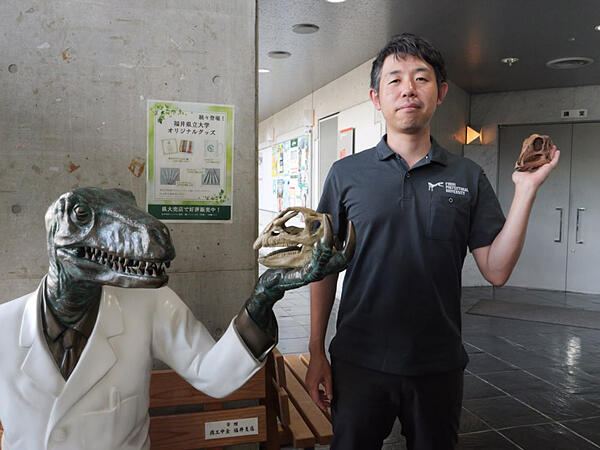
There were no right university courses for dinosaur enthusiasts
— Please tell us about the background and aims of establishing the Faculty of Dinosaur Paleontology.
While Fukui Prefecture is home to a treasure trove of dinosaur fossils of high global value, there were no right university courses for young dinosaur enthusiasts who wanted to pursue research. The Fukui Prefectural Dinosaur Museum is an exhibition-focused facility, which is not ideal for training research personnel. Even in the whole Hokuriku area, all paleontology laboratories of the universities focus primarily on invertebrates and are not always ideal for research on vertebrates, including dinosaurs.
To study paleontology focusing on vertebrates, students have to go to other parts of Japan, such as the Hokkaido or Kanto region, which would result in losing specialists. Even students who went to a distant university still had difficulty focusing their research on dinosaurs, and they needed to study within the broad framework of paleontology.
Our university launched the Institute of Dinosaur Research in 2013, which started graduate education in earnest in 2018. Once the new faculty is launched, the scope of our dinosaur education program will also include undergraduate students. From this spring, as a faculty specializing in dinosaur research, we hope to become an instrument to connect the rich resources in the region with young, ambitious people, promote research further, and develop human resources.

Provided by Fukui Prefecture
Partnership with the Museum in student learning, field practice, and digital utilization
— What can students learn at the Faculty of Dinosaur Paleontology?
Under the concept of "All Fukui, there is something to learn everywhere," students can learn mainly earth science, paleontology, and geology, which form the basis of dinosaur research. The three main non-conventional features of the program are a collaboration with the Dinosaur Museum, which is primarily in terms of human and material resources, field science practicums at the excavation sites of new dinosaur species, and new research methods utilizing digital technology.
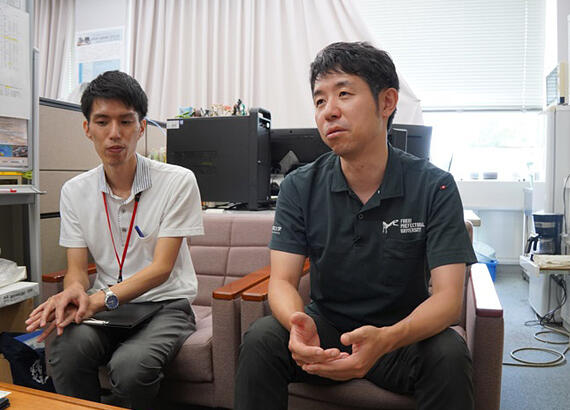
Under the Faculty of Dinosaur Paleontology, there will be the Department of Dinosaur Paleontology and Geology, in which two courses will be offered. The "Dinosaurs and Paleontology Course" is to learn orthodox paleontology, but its main selling point is dinosaur fossils.
This has irresistible appeal since most of the teaching materials in general paleontology education are fossils of organisms abundantly excavated in Japan, such as ammonites and shellfish. We also emphasized digital paleontology, so students will learn how to use digital equipment, such as computed tomography and laser scanners, and develop a deep understanding of their paleontological applications, including dinosaur research.
The other "Geology and Paleoenvironment Course," is to learn about the field of paleontology. In this area of study, fossils are not just the subject but also clues to studying the environment and its changes in the past. While studying geological formations and faults, the students will also learn how to use surveying instruments and drones.
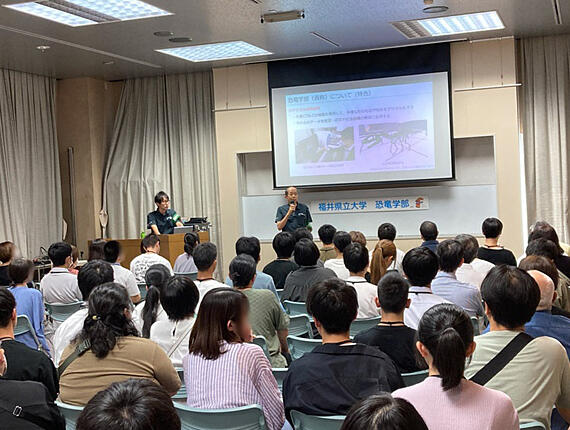
Provided by Fukui Prefectural University
Industry-academia collaboration to drive tourism promotion
— As a prefectural institution, do you have high expectations for community contributions?
Dinosaurs represent one of Fukui Prefecture's top brands. Aside from accepting dinosaur enthusiasts in Fukui Prefecture, the Faculty of Dinosaur Paleontology is unsurprisingly expected to increase the number of students from other prefectures. Katsuyama City is also trying to improve the living environment by offering a subsidy program to provide students with up to 25,000 yen per month.
At the same time, there are high expectations for our contribution to tourism promotion. As a museum, it is difficult to get involved in some commercial activities, so the university may be able to play a role in such activities in the form of industry-academia collaboration. We have previously designed "dinosaur labels" for sake in collaboration with Yoshida Syuzo, a sake brewery in Eiheiji-cho, in which our university is also located, and the Research Institute for Earth Science Visualization Technology, a venture company in Tsukuba City, Ibaraki Prefecture.
To promote such activities, we also established the "Dinosaur Institute" university venture in 2021 in collaboration with the Fukui Shimbun. We aim to develop research results directly into industries, such as product development, based on academic theories. We hope that these efforts and experiences can assist the establishment of the new Faculty of Dinosaur Paleontology to act as a tailwind for promoting tourism.
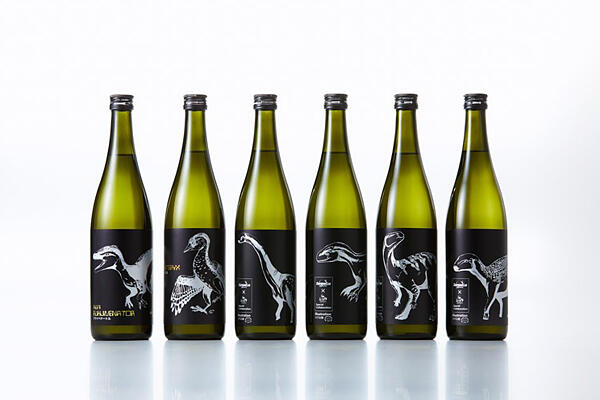
Provided by Yoshida Syuzo Co.
Utilizing combinations of knowledge to solve local issues
— The admission quota for the first fiscal year will be 30 students. This number seems large given the number of positions, such as researchers and curators.
Given the number of dinosaur-related positions in universities and museums, it is unlikely that all graduates will receive such positions. Then, I may sound like saying oversupply is a given, but we don't expect that all graduates will pursue career in dinosaur research.
To begin with, dinosaur research requires combinations of knowledge. In fact, we, as researchers, use a wide range of knowledge, including biology (of extant organisms), geology, environmentology, civil engineering, and computer science, as well as paleontology. The curriculum of the Faculty of Dinosaur Paleontology will naturally be designed to teach knowledge in these areas. We advise the students not to limit their future to career paths in dinosaur research but look for opportunities in fields in which they can demonstrate their abilities.
— What are the specific career paths in your mind?
The fields directly related to dinosaurs include media-, publishing-, and education-related professions. Careers as 3D- and art-related technicians and creators may also be options, because digital techniques have increasingly been used in recent dinosaur research.
The "VR Dinosaur Exhibition System: Fukui Dinosaur Edition," developed by Imai in cooperation with Dai Nippon Printing, allows for freely displaying dinosaur fossils from Fukui in a museum in a virtual space.
We believe that geological knowledge to be acquired at the Faculty of Dinosaur Paleontology will also be very useful in professions in other fields such as disaster prevention and geology consulting. These fields are particularly relevant to Fukui Prefecture, since it also has the largest number of nuclear power plants. One of our goals is to produce human resources who can contribute to solving regional issues with their knowledge in geology.
Communication skills and physical strength are necessary
— What are your expectations for students applying to the Faculty of Dinosaur Paleontology?
It may sound surprising, but many dinosaur researchers are not very good at chemistry and mathematics. Therefore, prospective students do not have to be overly concerned about whether or not you are good at or have expertise in science-related subjects, and I expect that they have a great deal of curiosity.
Questions in dinosaur research cannot be easily answered mathematically. Since it is necessary to accept various presumptions while conducting research, I want them to have a mind to enjoy something they don't understand as something they don't understand.
The logic of liberal arts is also required to describe your presumptions in a logical manner. Thus, it would be important to improve expression and reading comprehension skills by reading books, for example. Dinosaur researchers spend a lot of time, often including eating time and resting time, with other researchers from all over the world, so it is better to have a good understanding of matters like history, religion, and geopolitics. In my experience, the only thing that did not matter much was my musical ability.
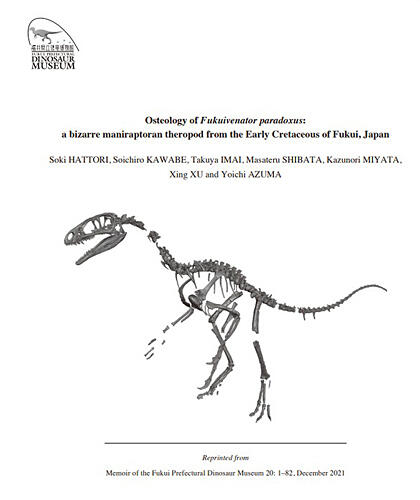
Provided by Fukui Prefectural Dinosaur Museum
Communication skills are also important, because dinosaur research involves a great deal of interaction with people from different industries. When we want an illustration that depicts the age of a fossil, we have to ask an illustrator to do a work for us, and excavation work is not possible without the cooperation of civil engineering contractors. The ability to build good relationships with such people is also required. On top of these abilities, there is the absolute need for physical strength! Since excavation is done mainly in the summer in the searing sun.
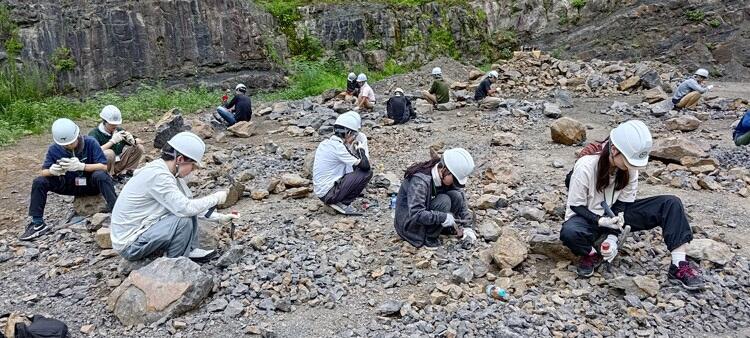
Provided by Fukui Prefectural University
A rare field of science that entertains a million people a year
— Finally, what are the fascinating points and value of dinosaurs and dinosaur research?
Dinosaurs are enigmatic creatures. I feel a great sense of accomplishment not only when I discover a new species, but also when I reveal something that knew about and present it in public.
Dinosaur research cannot directly make people healthier or their lives more convenient. Nevertheless, nearly one million people visit the Dinosaur Museum every year to see the results of such dinosaur research. There are not many other fields of science that entertain a million people. Dinosaurs and fossils may be one of the best options as an "entrance" to science.
In other words, I believe that dinosaurs are steppingstones to the development of science. I would like to contribute to that by communicating the results of my research.
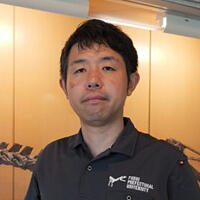
Profile
Takuya Imai
Associate Professor, Institute of Dinosaur Research, Fukui Prefectural University / Researcher, Fukui Prefectural Dinosaur Museum / Visiting Researcher, Dinotech Lab, Research Institute for Earth Science Visualization Technology / Technical Director, Dinosaur Research Institute
Born in Tokyo in 1987. He completed his B.S. and M.S. at Montana State University's College of Science before returning to Japan. He completed his doctoral studies at Kanazawa University's Graduate School of Natural Science and Technology in 2019. Ph.D. (Science). Researcher, Fukui Prefectural Dinosaur Museum since 2015. Other current positions since 2019. He specializes in dinosaur reproduction and ornithology of the dinosaur era, with a particular focus on Early Cretaceous terrestrial strata in Japan. His recent efforts include new-age geology education utilizing virtual technology in collaboration with private companies.
(SEKIMOTO Kazuki / Science Portal Editorial Office)
Original article was provided by the Science Portal and has been translated by Science Japan.




